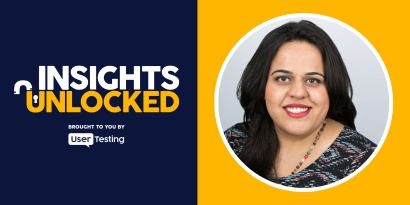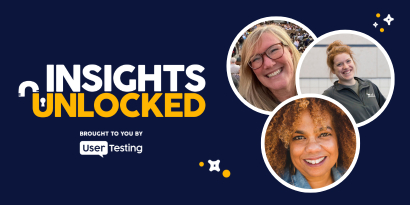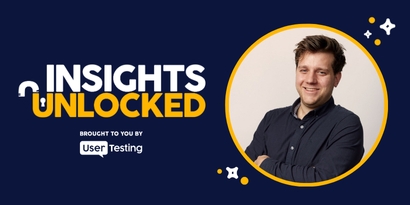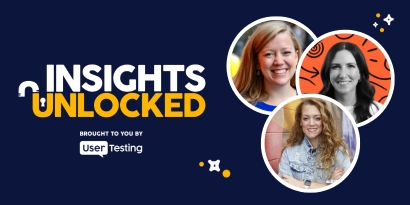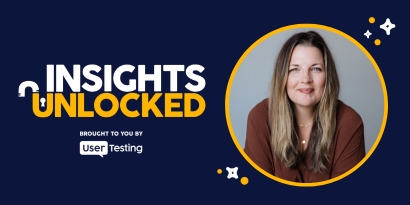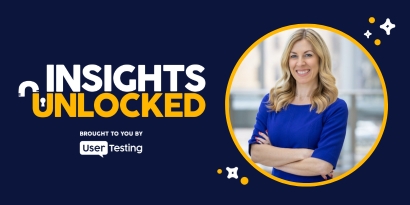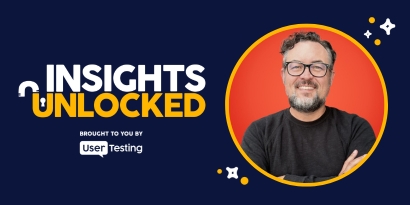
Episode 145 | November 18, 2024
Creating new campfire moments: how the BBC designs for inclusivity
See how a discovery project with a core audience is inspiring the BBC to rekindle “campfire moments” in the digital age through inclusive design.
Creating campfire moments: the BBC designs for inclusivity
Our hardest-to-reach audiences push us to think differently,” says Emma Whitby, UX researcher at the BBC.
The BBC’s User Experience and Design (UX&D) team is taking on a critical challenge: designing digital platforms that make sense for retirees who have relied on traditional broadcast media for years. In a recent Insights Unlocked podcast episode, Emma and senior design researcher Aleks Gojkovic shared how empathy-driven UX research can build digital bridges for older audiences, ensuring they are supported in today’s digital-first environment. Their work highlights the power of inclusive design to not only engage retirees but also inspire broader innovation across digital products.
The BBC, or British Broadcasting Corporation, is the United Kingdom’s public service broadcaster, renowned globally for its high-quality news, educational programming, and entertainment. From BBC News and award-winning documentaries to live sports coverage and entertainment shows, the BBC serves millions worldwide, fulfilling its mission to “inform, educate, and entertain” while promoting universal access to information and culture.
The BBC's User Experience and Design (UX&D) team is a multidisciplinary group dedicated to creating digital experiences that meet the diverse needs of the BBC's global audience. The UX&D team applies a human-centered approach to all aspects of digital design, ensuring that content is “useful, usable, and user-friendly” for everyone. By conducting in-depth UX research and testing, the team helps shape digital platforms to be inclusive and accessible, especially for underrepresented or less tech-savvy audiences. Aleks explains, “Everything we do starts with our users,” emphasizing that their work seeks to “bring the BBC’s mission to life for all audiences.” Working closely with departments across the BBC, the UX&D team is at the forefront of digital innovation, making sure that each product reflects the organization’s values of accessibility, inclusivity, and public service.
Understanding the needs of retirees
The BBC's UX&D team recently conducted a discovery project focused on retirees, many of whom find modern digital platforms overwhelming. Emma shared how they approached this project: “Our research objective was to understand the challenges that this older generation faces when transitioning from broadcast to digital services,” she said. The goal was clear: bring this loyal audience into the digital fold while respecting the unique relationship they have with traditional media.
The research was immersive and involved attending community coffee mornings to hear firsthand from retirees. Emma explained, “TV and radio aren’t just media to this audience; they’re integral companions that shape their daily routines.” For many retirees, TV and radio help combat loneliness and offer structure. Understanding these personal nuances allowed the team to identify pain points that data alone could not reveal.
“Our hardest-to-reach audiences challenge the status quo and push us to think differently.” — Emma Whitby
Avoiding costly product missteps with deep user insights
Discovery projects like this offer significant benefits for organizations, especially as they develop new or expanded digital services. By focusing on the experiences of retirees—an often-overlooked demographic—the BBC team gained critical insights that could prevent costly errors in product development. “Data gave us clarity, but storytelling allowed us to capture hearts and minds,” Aleks explained. This combination helped the BBC identify usability issues before they could become bigger barriers for end users.

This type of research ensures that product updates or changes are not only useful but also truly usable for the intended audience, reducing the likelihood of alienating key user groups or needing extensive revisions after launch. Understanding these needs early helps organizations innovate more effectively and make strategic design decisions that align with users’ real-world expectations.
Blending big data with empathy
One of the most innovative aspects of the BBC’s approach was the combination of data and empathy to tell a compelling story to stakeholders. According to Aleks, data was crucial in demonstrating the scale of the opportunity and validating that retirees are a significant user group. "Using big data alongside UX research allowed us to change the narrative,” Aleks said. “We could show stakeholders the size of the opportunity and move the conversation from pain points to possibilities.”
This blend of quantitative and qualitative insights made a significant impact, shifting the conversation from simply addressing challenges to envisioning new opportunities for both the users and the business. The BBC team’s findings showed that by addressing the accessibility needs of retirees, they could actually improve usability for everyone—a win-win for the BBC and its audience.
“When we design for accessibility, we create better experiences for everyone.” — Aleks Gojkovic
Bringing insights to life with the Blue Room
The BBC’s collaboration with the Blue Room, an internal tech demo lab, is one of the most hands-on and innovative methods for translating UX research into real-world solutions. By recreating 3D digital versions of retirees’ living spaces, the UX&D team helped stakeholders experience the accessibility barriers retirees face daily.
These digital replicas, complete with TV setups and living room layouts, allow BBC teams to better understand the physical and cognitive challenges their audience encounters with digital products. Whitby noted, “Seeing these spaces firsthand changes how people think about designing for accessibility. It’s not just theory; it’s real life.”
Shaping the future of accessible design
This discovery project has catalyzed new conversations across the BBC, influencing how product teams approach design for a diverse audience. Emma and Aleks’ work demonstrates that designing for inclusivity benefits all users. By investing in empathetic UX research, the BBC UX&D team is setting an example for creating digital experiences that truly serve everyone.
Aleks summed up the project’s impact, stating, “Our goal is to bring everyone along on the journey into the future of digital public service.”
“Designing with empathy is not just for their benefit; it’s for everyone.” — Emma Whitby
Episode Links:
- BBC’s Global Experience Language (GEL)
- BBC What is UX&D?
- BBC UX&D on LinkedIn
- Aleks Gojkovic on LinkedIn
- Blair Fraser on LinkedIn
- Designing for diverse audiences: This webinar explores strategies for crafting inclusive user design experiences that address the needs of diverse audiences.
- Diverse and inclusive perspectives templates: These templates provide guidance on ensuring a representative sample of contributors and learning more about historically underrepresented groups.
- Diversity and inclusivity in UX research: how and why it matters: This blog post discusses the importance of including diverse perspectives in UX research to create better decision-making processes.
- 16 tools and resources for improving online accessibility: This blog post offers a list of tools and resources to enhance online accessibility, ensuring digital products are usable by everyone.
- Considerations for accessibility testing: This knowledge base article provides best practices and recommendations for conducting accessibility testing.
- Designing accessibility for everyone with Karen Hawkins: This podcast episode features insights on creating accessible digital experiences for all users.
